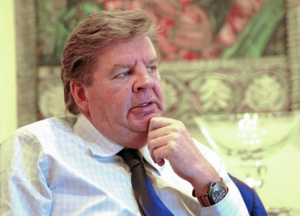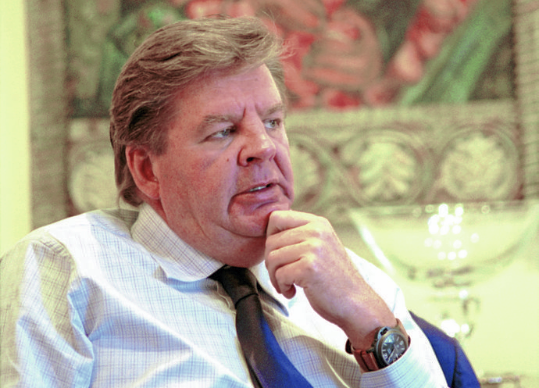
The multi-billionaire was a guest on the Chairman’s Conversation, an annual event hosted by the radio station’s founder Given Mkhari.
Rupert, who is chair of the Swiss-based luxury-goods company Richemont as well as of South African-based company Remgro, faced tough questions from the Johannesburg crowd following a two-hour one-on-one conversation with Mkhari in which he touched on various topics including corruption, land expropriation, investor confidence, building a sustainable business and the Afrikaner Broederbond.
Speaking about the business his father Anton founded 70 years ago, Rembrandt – which was later split into Remgro and Richemont, he reminded Mkhari and the crowd that the business only started making profits 30 years later, emphasising the fact that there was no such thing as overnight success.
He also touched on the fact that unlike in other countries, the SA Revenue Service (SARS) did not treat big business leaders like himself with the appreciation that they received from their counterparts overseas, which didn’t sit well with him as a loyal South African.
“For very many years our so-called family companies brought back more dividends than the rest of the Johannesburg Stock Exchange put together. These are facts.
“So what do you get? You stay loyal to the country, you create jobs, you pay tax, and you know I give my salary away. I thought the job is, if you’re a good South African that’s what you do. In the rest of the world, people like people like that. They say: ‘Please come to our country to create jobs, please come to our country to pay proper salaries, please come to our country to pay tax, and then give donations.'”
He was asked whether any of the dividends from his business abroad made their way back into South Africa.
“Do you know the difference?” he said pointing out that the Swiss ambassador was in the attendance.
“In Switzerland I got a letter of ‘Thank You’ from the taxman… but here they harassed me for eight years. So unlike what your friend with the red beret thinks [seemingly referring to EFF leader Julius Malema]… who said five years ago that I am ‘influential’ in SARS, no, no – the opposite.”
When asked whether he thought the fact that his father had grown up during the great depression in South Africa had something to do with his drive and ultimate success in business, Rupert said yes.
“That’s the reason… In a sense, the Afrikaner was downtrodden. The poor white question… but they were driven. They studied like crazy, they saved like crazy.
“They didn’t go and buy BMWs and hang around at Taboo or The Sands [upmarket clubs] all the time.”
He then said the current narrative around former president Nelson Mandela being a sell-out was “totally disrespectful”.
“I don’t see your generation going to jail for decades, no, you’ll miss The Sands,” he said to Mkhari.
He suggested that the current generation of youths should be respectful to their elders and added that he hadn’t seen any leadership among them yet.
“Remember I met Steve Biko when he was in his 20s and he wouldn’t have carried on in Taboo.”
Speaking of his Afrikaner heritage, Rupert said he was proud of it but said based on their history in the country, they too had been an oppressed nation and still felt “endangered” as a people to this day.
However, he acknowledged the effects that racial divisions caused in society, saying he’d had similar conversations with Biko.
“When I met the late Steve Biko, after many hours of discussions, we came to the conclusion that we will never have peace in this country if Afrikaner nationalism and black nationalism cannot come to a compromise. That was in [19]73/74; we’re sitting in 2018, we’d better find that compromise.”
When asked his thoughts on land expropriation without compensation, Rupert said it was an emotive issue for both black and white South Africans, but said it was obvious that there needed to be redress.
“In America they’ve got a thing called Eminent Domain where if it’s in the absolute public good, land can be expropriated [but] it’s how it’s done, because the last 10 years has not really been good in terms of state interference, if you look at the fiasco we’ve had [politically].
“I don’t think we’ll ever have peace until there is a proper redistribution. I wouldn’t say land, I would say property and that we grow the economy… It’s not a question of doing it, it’s how it’s done… Let’s not fall into the trap of Zimbabwe and Venezuela. Everything looks good on paper, but the game is played on grass.”
On whether he would be willing to reach out to President Cyril Ramaphosa and his administration to give some pointers from the side of business, Rupert said he had been labelled as “toxic” by “a little Venda in a red beret”.
“I’m toxic. You shangaans have made me toxic, well Vendas, sorry. There’s a little Venda with a red beret. You guys have made me toxic.”
He said the last time he had engaged with a government was under former president Thabo Mbeki’s administration. He alluded to Ramaphosa possibly avoiding seeming as if he were “captured” by business.
“President Mbeki wasn’t scared… you need a proper dialogue, but for that, both parties need to trust the other side’s bona fides.”
He said Mbeki had created a good environment for investment.
“We let [former] president Mbeki down because he created a perfect scenario for business to invest, but I think we couldn’t believe our luck and we should have invested more, in the private sector.”
International investors were now looking to see if they would be investing locally, in their own markets, he said.
“But you know we need a little bit of love from the government and not being told: ‘You white monopoly capitalist’ etc.”
On job creation, Rupert said there was a misconception that it was big business’ role to create jobs, but that the majority job creators were actually found in the small and medium enterprises sector globally.
Rupert again attacked SARS, calling them “thugs”, for standing in the way of businesses.
“Do you know what those thugs at SARS did when they withheld the VAT? Do you have any idea what they did to small businesses when R20bn odd got withheld? They should all go to jail for just that. Cut the red tape, help the small medium business people – they create jobs worldwide.”
Speaking on corruption, Rupert said if he were allowed to run government he would take South Africa into his confidence and tell them exactly what was going on.
“I have a problem that all of our politicians have, for the last 10 years treated voters like fools. Voters are not fools, voters are highly intelligent. There are people all over the country that are looking for leadership, be honest with them and be transparent with them.”
Rupert also denied being part of any white monopoly capital or the so-called “Stellenbosch Mafia”, and said he was not aware of either.
He did however acknowledge that his father had in the past been a member of the Afrikaner Broederbond, but later left the grouping. He himself had never been part of any secret organisation, he said.
On transformation, Mkhari explained that young black business people often struggled to gain access and were looking for a way in, through the likes of Rupert and other influential business leaders. Rupert suggested that Mkhari gather young professionals together into the same room and promised to bring his business friends.
“I don’t have a problem as long as people understand that there are no overnight successes.”
He then said Mkhari should not bring any tenderpreneurs.
“No tenderpreneurs – a lot of Shangaans are very good at this. Firstly it was the people from the Eastern Cape that must eat, then the people from KZN that must eat and now it’s the Shangaans [and] Vendas.”
His comments have received major backlash on social media. But Rupert maintains he was not trying to offend anyone and was just stating facts.
In response to a question by journalist and PowerFM presenter Iman Rapetti on being labelled as racist by some watching the interview and posting their views on Twitter, he said: “I’ve been accused of a lot of things… In the old days, when you were against apartheid you were called a communist, nowadays if you’re against corruption…. How do you defend being called a racist? Luckily I’ve never been called that in public or in private and my friends know that it doesn’t exist and I actually take exception to that.”
Referring to the Taboo reference, Rupert said: “I didn’t say black people, I said people. Do you think white kids don’t do the same? Do you think a whole generation of children don’t do the same? What I’m trying to say is a previous generation didn’t do it… There is globally, a sense of ‘consume now’. That’s what I said to him and if people want to take it personally, they should really question as to what the parents gave up and what the grandparents gave up…
“I’m sorry if it came across as racist; it’s not racist, it is a philosophy that people must understand that you can’t consume now and pay for it tomorrow.”
In response to a black farmer who had described him as arrogant and a member of the Black Management Forum who has said black people should deduce from the interview that as young black professionals they were now “on their own”, Rupert said he had endured attacks from the BMF for years without responding to them.
“I’ve said the big problem in this country… instead of people debating facts, they get personal, they attack individuals and attack their children and that’s a Donald Trump-type style. I think all of us are adult enough to debate issues, but why get personal all the time. We carry on like this, the other side loses interest very quickly.
“Our country’s got very serious problems, best illustrated by the clear division tonight. There’s clear hatred, there is clear animosity and insults; quite frankly, if that’s the attitude I can tell you that we’re going to have serious problems in this country… Quite frankly, I’m very happy not to get involved; I’m quite happy to spend time with friends and children and not to help… there are many other countries where you don’t get insulted like this.”
One audience member said Rupert’s white privilege had helped enable his current level of wealth and suggested that he help use some of it to help boost young black entrepreneurs in Mamelodi, he said: “I’ve tried my best. My people, who work with me are happy. They’ve all got homes, I look after their kids and give them bursaries, and I’m not Father Christmas that can look after the whole country.
“I’ve been luckier than I thought I would, I made more money than I thought I would and that I often think I deserve, and my mother taught me to share, and I really give away a lot more money than I spend on our family. Quite frankly, I don’t need lessons in sharing, because I know what I do and luckily the people close to me know what I do.”

